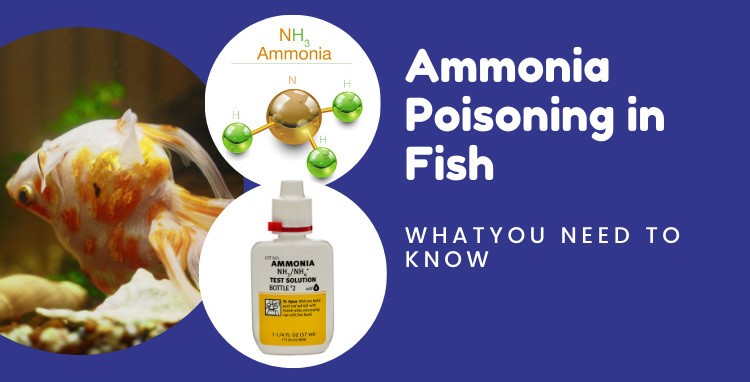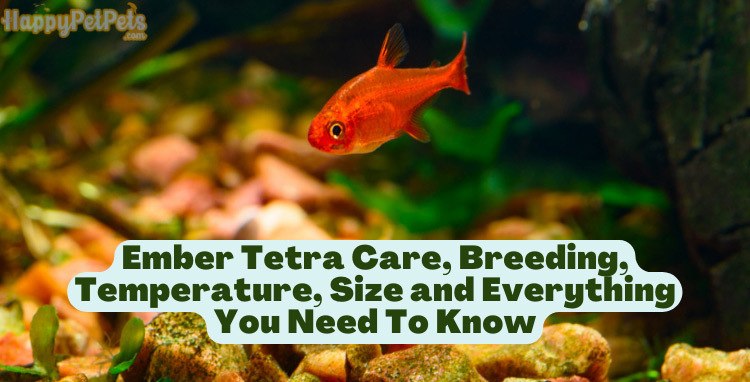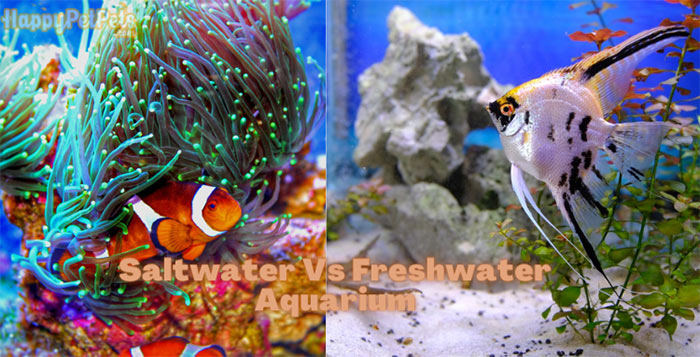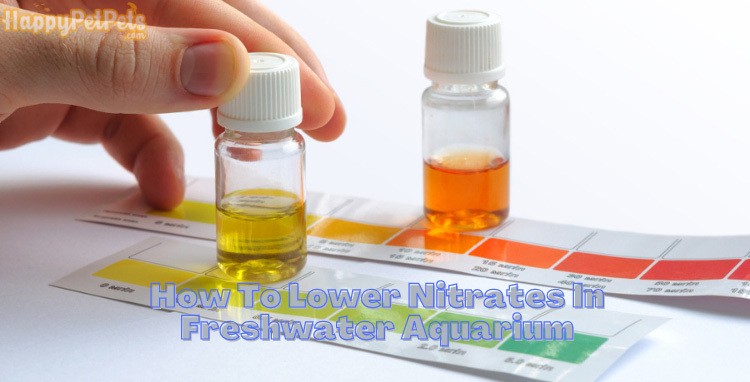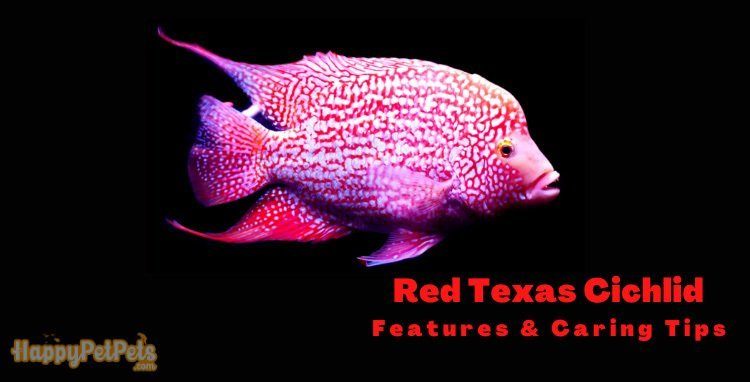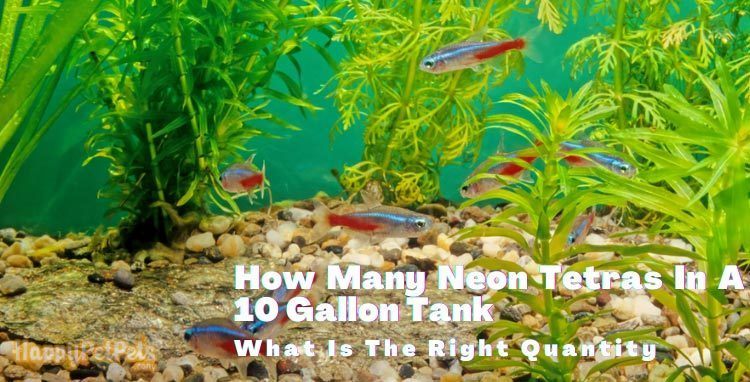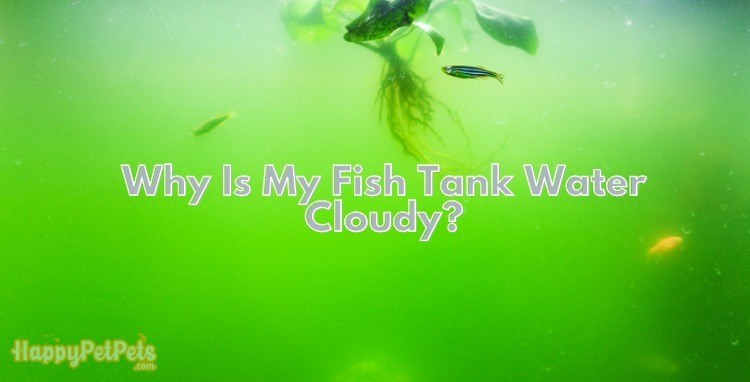Fish are particularly vulnerable to ammonia toxicity. Both freshwater and saltwater fish are at risk, although freshwater species are more vulnerable to changes in pH or water hardness.
But don’t worry! Fortunately, there are a few simple ways you can keep an eye on your aquarium and avoid this from occurring. ammonia poisoning fish
What Is Ammonia Poisoning?
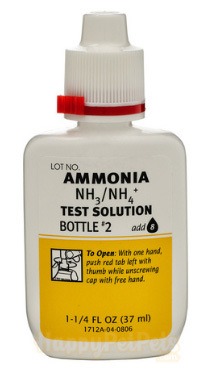
Ammonia NH3 Test Solution Bottle 37ml
Ammonia poisoning, often known as “new tank sickness,” happens when your fish tank has an excessive amount of ammonia. Even though this is a rather common sort of chemical to find in water, high concentrations of it can be dangerous.
To tell the truth, you can’t truly see ammonia, but its presence will change pH values to make them look lower than they are. This might deceive you into believing that your tank is in good health while, in reality, its levels are increasing.
If your pets are exposed to these circumstances, they are at risk of serious harm. High quantities of ammonia burn fish’s gills, skin, and fins, poisoning them. This is very unpleasant for them and may result in their death very rapidly. It is also possible that it will result in permanent vision loss or harm to the brain. As a result, it’s critical to keep an eye on water quality and respond quickly if ammonia is found.
Ammonia Poisoning Is Caused By What?
There is an increased amount of ammonia poisoning in the tank, which is commonly caused by a new fish or by overcrowding the tank. It’s possible, too, because:
Overfeeding Is A Problem For Fish.
Ammonia levels in aquariums may quickly rise if your fish are overfed. As a result of the excess food, they will not only be unable to consume it completely but will also discharge waste back into the environment of water. Ammonia levels rise as a consequence of these waste products.
It is a good idea to feed your fish only as much food as they can consume in one minute if you are unsure of how much food to give them. To avoid ammonia issues in the future, this assures that none of it will decay. After a few minutes, take out any leftovers.
Insufficient Water Flow
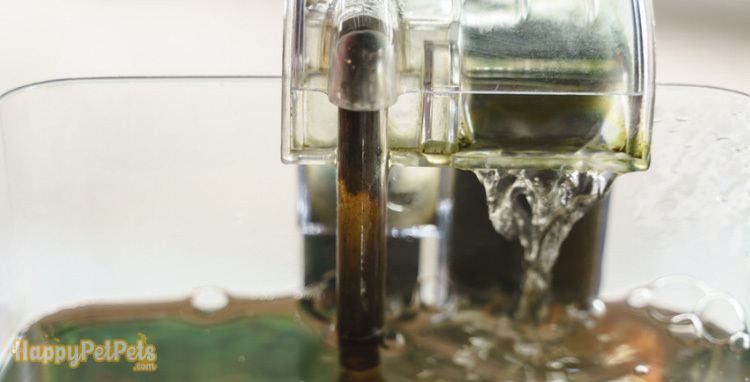
Fish tank water flow running pump
Ammonia will build up in the water, as it does with all other pollutants. If your aquarium is stagnant, toxic chemicals and organic materials may rapidly accumulate and endanger your fish. This is why it is important to have appropriate filtration in order to maintain a healthy environment of water in your fisk tank.
Your tank’s water circulation may be improved by using a high-quality filter. This will eliminate hazardous chemicals and prevent them from accumulating to unhealthy levels your fish . Choose a filter that’s the right kind and size for your tank. When it comes to filtering fish tanks, there are some that are better for smaller aquariums, while others are better for larger ones.
Poor Fish Tank Care
Dirty tanks and inadequate maintenance may also contribute to ammonia. When dead plants and other water detritus sink to the bottom of a aquarium, they begin to decompose and produce dangerously high amounts of ammonia for fish. Fish waste and unconsumed food may also add to the problem.
To maintain toxin levels as low as possible, the greatest thing you can do is keep your tank clean. Smaller tanks need more frequent water changes so that you can keep an eye on water quality more often. Frequent water testing is the most effective method for keeping tabs on aquarium water quality.
Unsuitable Water Sources
In their aquariums, many fish keepers utilize water that has been treated by the city’s water treatment facilities. Despite the fact that this water is acceptable for human consumption, it does not provide fish with a suitable habitat. Water treatment businesses add chlorine but also fluoride to city water, which are both chemicals that may be detrimental to your fishs when present in excessive doses.
In the event that you want to utilize municipal water as opposed to tap water, be sure to use water that has been sitting out for at least 24 hours. The chlorine will be able to disperse and be less toxic to your fish as a result. When using municipal water, it’s best to cleanse it first using dechlorinator before using it.
Ammonia Poisoning in Fish Symptoms and Signs
Ammonia poisoning may be detected early if you know how to recognize the warning indications of the condition. Your fish has a good chance of survival if you catch it quickly. As a result, the following are some typical indications and symptoms include:
Skin, Fins, or Gills Redness
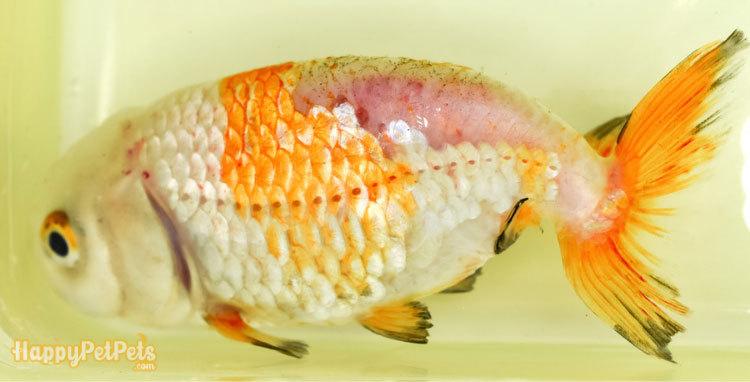
Ammonia Poisoning in Fish Symptoms and Signs
A red rash appears on the skin and gill tissue when exposed to ammonia. In addition, a bloody look in the fins and gills of your fish might make it harder to breathe, making it more likely that your fish will die.
You should immediately increase the frequency of water changes if you notice this symptom, since it’s a clear indication that the ammonia levels in your tank are too high.
Fatigue and a Drop in Appetite
If your fish are suffering from ammonia poisoning, they will become lethargic, sickly, might lead fish to stop eating and engage in abnormal behavior. As a result, the ammonia makes it harder for your fish to breathe, resulting in a significant lot of tension and agony for them.
If you find that your fish aren’t performing normally, eating less, or being less energetic than usual, it’s likely that the water is contaminated with ammonia.
Swimming Problems
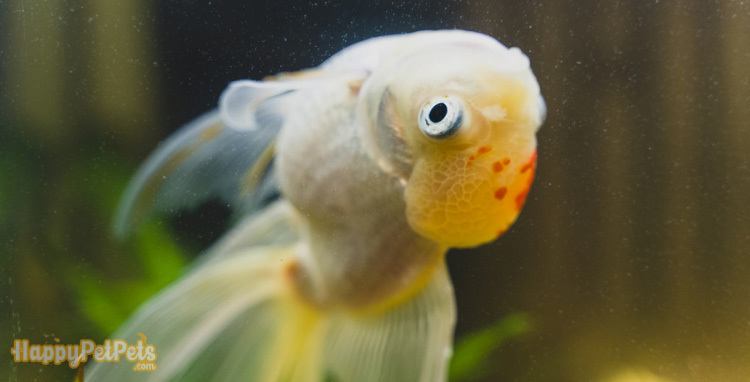
Sick goldfish swims upside down in aquarium effected by amoniac
Having ammonia in your fish tank can make it hard for them to swim, which will make them confused, disoriented and lethargic. This is due to the substance’s effects on the respiratory system, which are preventing them from obtaining adequate oxygen into their gills.
This is particularly true if your fish are swimming at the top of the tank, since this makes it simpler for them to take in oxygen-rich air.
Rubbing itself against various
When your fish begin to scrape against the rocks or other decorations in the tank, it is typically an indication that something is wrong. This occurs, due high amounts of ammonia, your fish will begin rubbing itself against various surfaces in an effort to relieve the discomfort.
Ammonia Poisoning in Fish: How to Treat It
Because of the fragility of their respiratory systems, freshwater fish are especially vulnerable to this kind of poisoning. Ammonia levels should be reduced as soon as your fish start gasping for breath.
You should know that there really is no method to directly cure this illness. To reduce the effects on fish’s respiratory and brain systems, you should treat the tank immediately with medicine.
Change A Lot Of Water
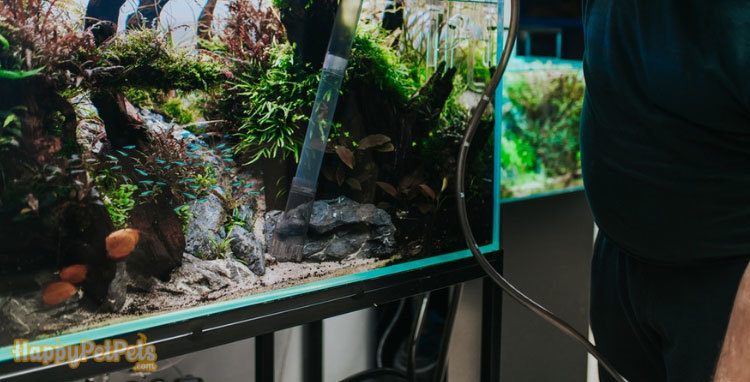
Changing water in aquarium using siphon
Large water changes are the best therapy for fish suffering from this kind of harm. A daily water change of 20% is sufficient in an aquarium with filtered water. Dechlorinated water from the pet shop or tap water treated with a conditioner may be used if you don’t have access to filtered water.
It’s best not to combine the two kinds of water, since this will create more difficulties. Once your fish have recovered, it is critical that you continue to monitor the water’s ammonia levels on a regular basis. Your fish will not suffer if you use an effective ammonia test kit to identify and reduce high levels of ammonia.
To avoid ammonia accumulation, you should replace your water often. Maintaining appropriate water conditions for your fish will help to prevent this issue from recurring.
Adding Beneficial Bacteria
Another option is to add bacteria colonies to your aquarium to aid in the breakdown of ammonia. When it comes to eliminating this dangerous toxin from the environment, anaerobic bacteria are the most effective option.
Seachem Stability, for example, is one of the many products on the market that include these microorganisms. As soon as you add it to your tank, it will set to work cleaning it and keeping it that way.
When introducing helpful bacteria to your aquarium, be sure to read and follow the instructions carefully. Otherwise, you run the risk of doing more damage than.
Medication is an Alternative
You may need to take medicine if your fish continue to exhibit symptoms despite your best efforts. Many different treatments are available to assist lower the ammonia levels in your tank and ease your pet’s breathing.
A chemical that removes ammonia, like AmQuel or Ammo-Lock, might be used as an example. Your fish will no longer be poisoned by nitrogen molecules if you use this product. Filtering aquarium ammonia using activated charcoal or zeolite proteins is another option popular among aquarium enthusiasts.
Medications can help, but they aren’t a long-term answer. You should only take medicine as a last option since it might create negative effects including stress and toxicity.
Refrain from feeding
When ammonia levels are high in an aquarium, you should also refrain from feeding your fish for at least 12 hours. Remove any uneaten food from the tank if at all feasible to further lower ammonia levels.
In most instances of poisoning It’s recommended to avoid feeding your fish again until the symptoms have subsided . This will lessen the strain on their sensitive respiratory system and protect them from inhaling additional hazardous contaminants.
It’s important to keep in mind that if a sick fish becomes too weak to swim, starvation might have unintended consequences. If you see that they are having difficulty swimming, it is necessary to offer them some specially prepared food so that they may rebuild their health and return to normal.
Wait!
In order to successfully treat this illness, patience and persistence are essential. While there are no quick answers for the issue at hand, patience and perseverance are necessary to get your fish back in working order.
It might be days or even weeks before you see a difference in the health of your fish. Your fish will have a much better chance of surviving if you follow the instructions above and make sure they have access to clean water.
Via YouTube: Ammonia Poisoning In Fish Fish Disease Prevention And Treatment
Conclusion
In fish, ammonia poisoning may pose a major threat. However, there are a number of safe and effective solutions to address this problem without compromising the quality of your tank’s water. Maintaining healthy living conditions and keeping ammonia levels low is all that is needed to get your fish back to normal.
To prevent or cure ammonia poisoning, there are several options available to you. Share this post with a friend who may find it interesting, and feel free to ask any questions you may have in the comments section below!
References
- https://happypetpets.com/category/aquariums-accessories/fish-tanks/
- https://happypetpets.com/
- https://www.thesprucepets.com/ammonia-poisoning-1378479
- https://www.birdexoticsvet.com.au/fishamphibians/2020/6/9/treating-ammonia-toxicity-in-an-aquarium-or-fish-pond
- https://animals.mom.com/treat-ammonia-poisoning-aquarium-fish-9314.html

